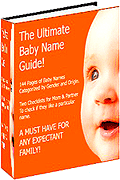Distinctive Names and Trends - Cool and Unique Baby Names
Page 2
5. At times, your baby will tire of communication. She may turn her head away from you or cover her face. When this happens, don’t attempt to force her to talk to you.
6. Don’t talk to the baby continuously. Allow her space to respond in her own way. Let her complete sentences herself; don’t do it for her.
7. Identify objects by their names. When the baby shows curiosity about any object, use it as an opportunity to help expand her vocabulary. Name animals, trees, colors, objects and more.
8. Repetition helps the baby learn. Repeat object names, sentences and nursery rhymes.
9. Play games like peek-a-boo or pat a cake. While the baby can’t speak real words, she’ll respond with her own babbling language.
10. Some studies say that background noise like television can hinder a baby’s ability to pick up language. Adults who are hard of hearing may struggle to understand conversation at a noisy party. The situation is even worse for a baby who doesn’t even understand the language in the first place. So try to minimize such background noises.
About The Author
Peter Andrews is a successful author and has written extensively on parenting. Check out http://www.best-parenting-advice.info/ and http://www.best-parenting-advice.info/parenting-help.html for his articles covering parenting tips, baby care ideas and many other related areas.
|
Parenting: Ten Things You Can Do to Develop Your Baby’s Language Skills
Back to Page 1
